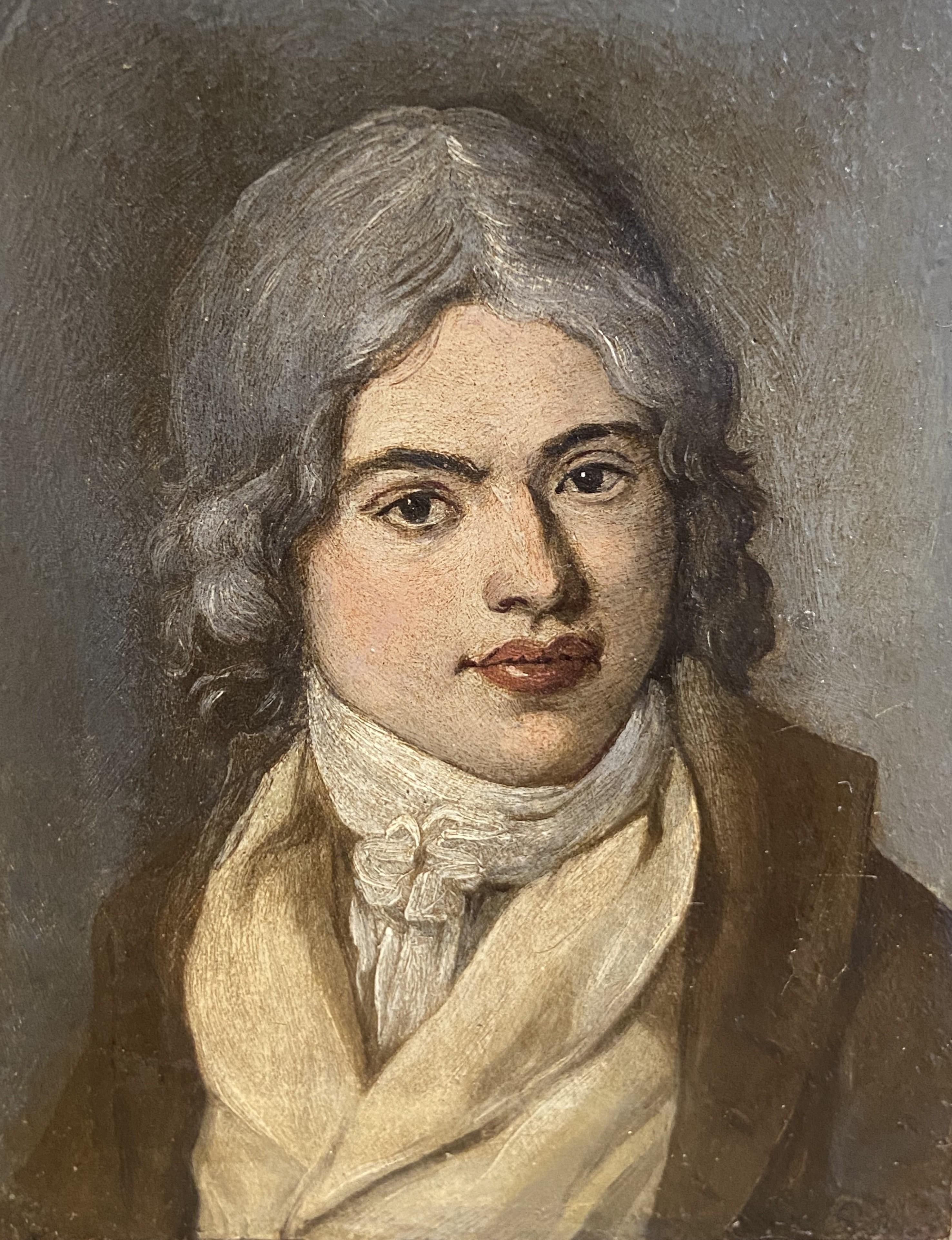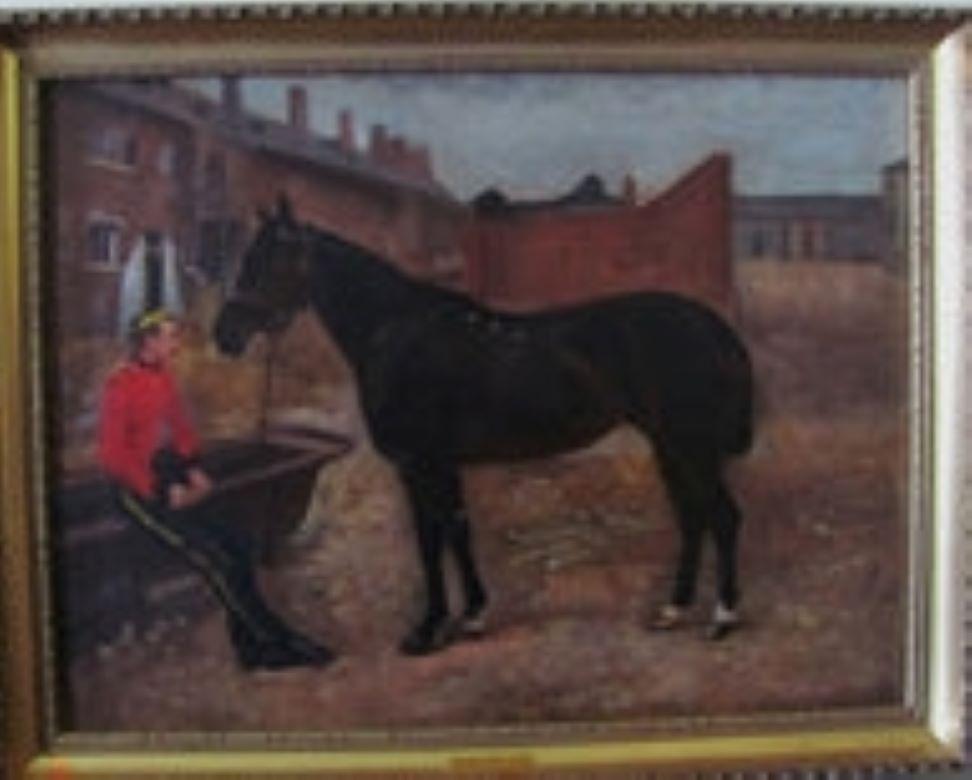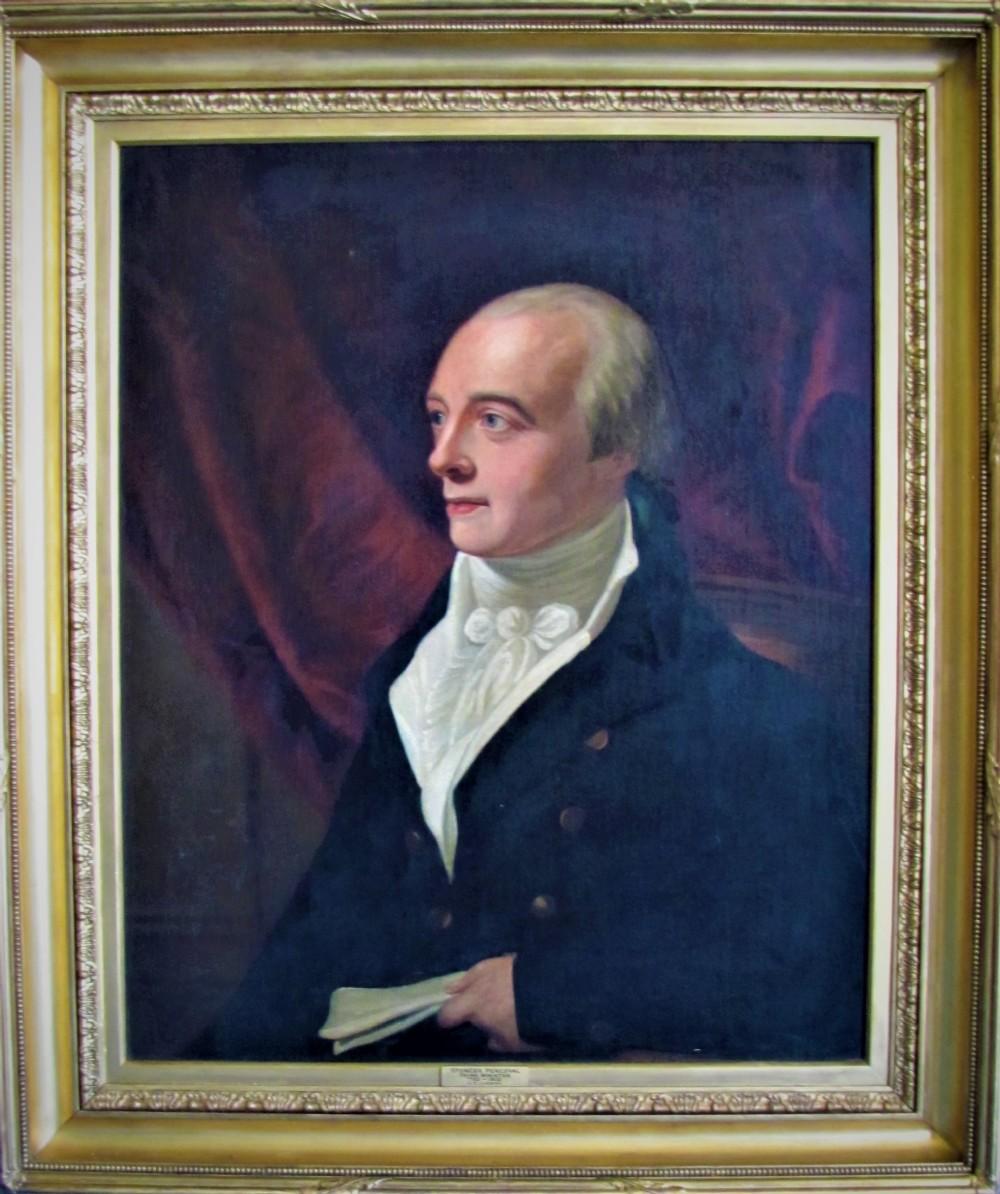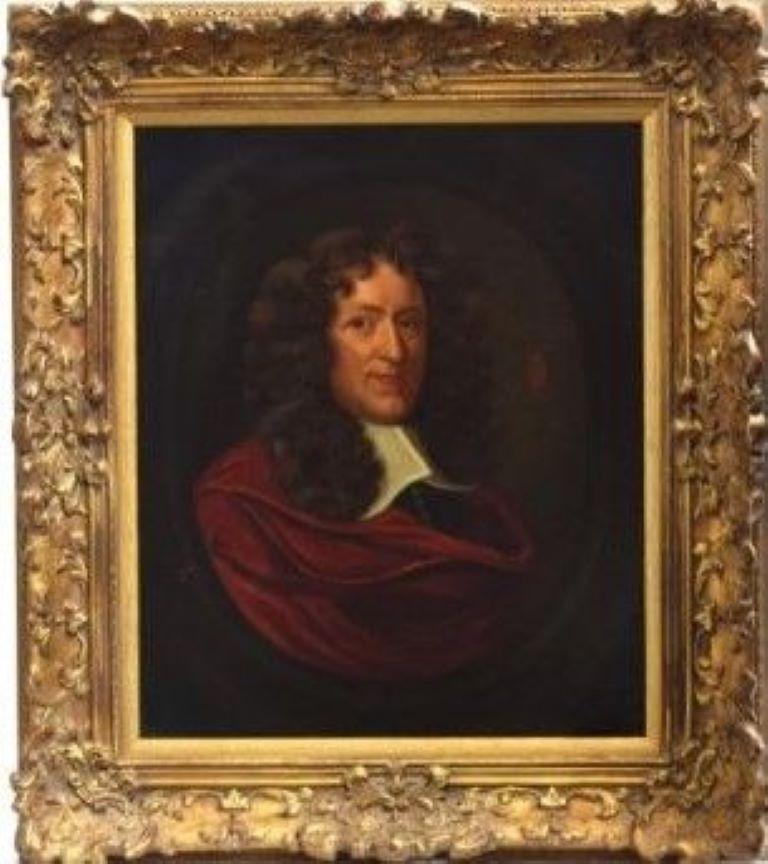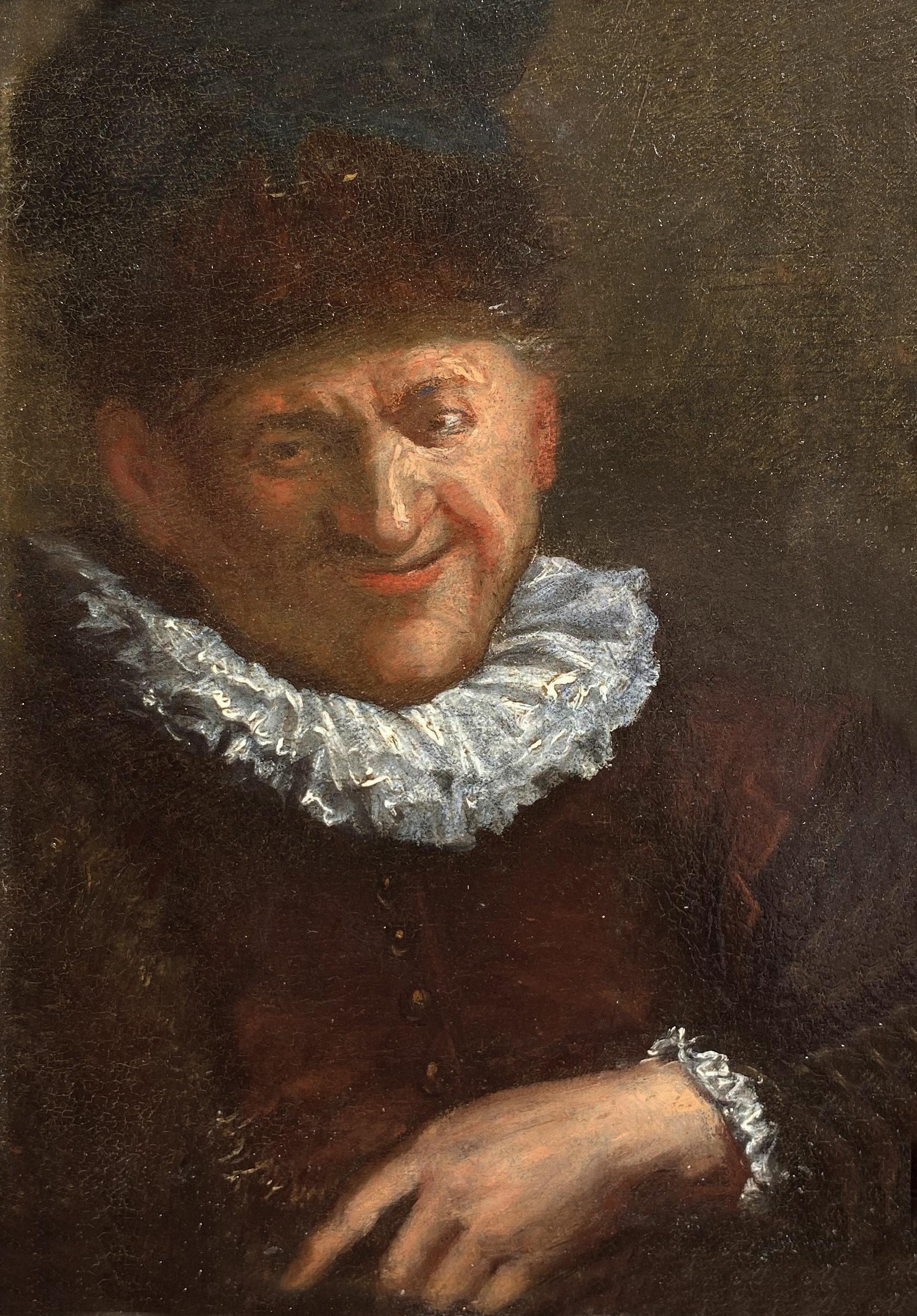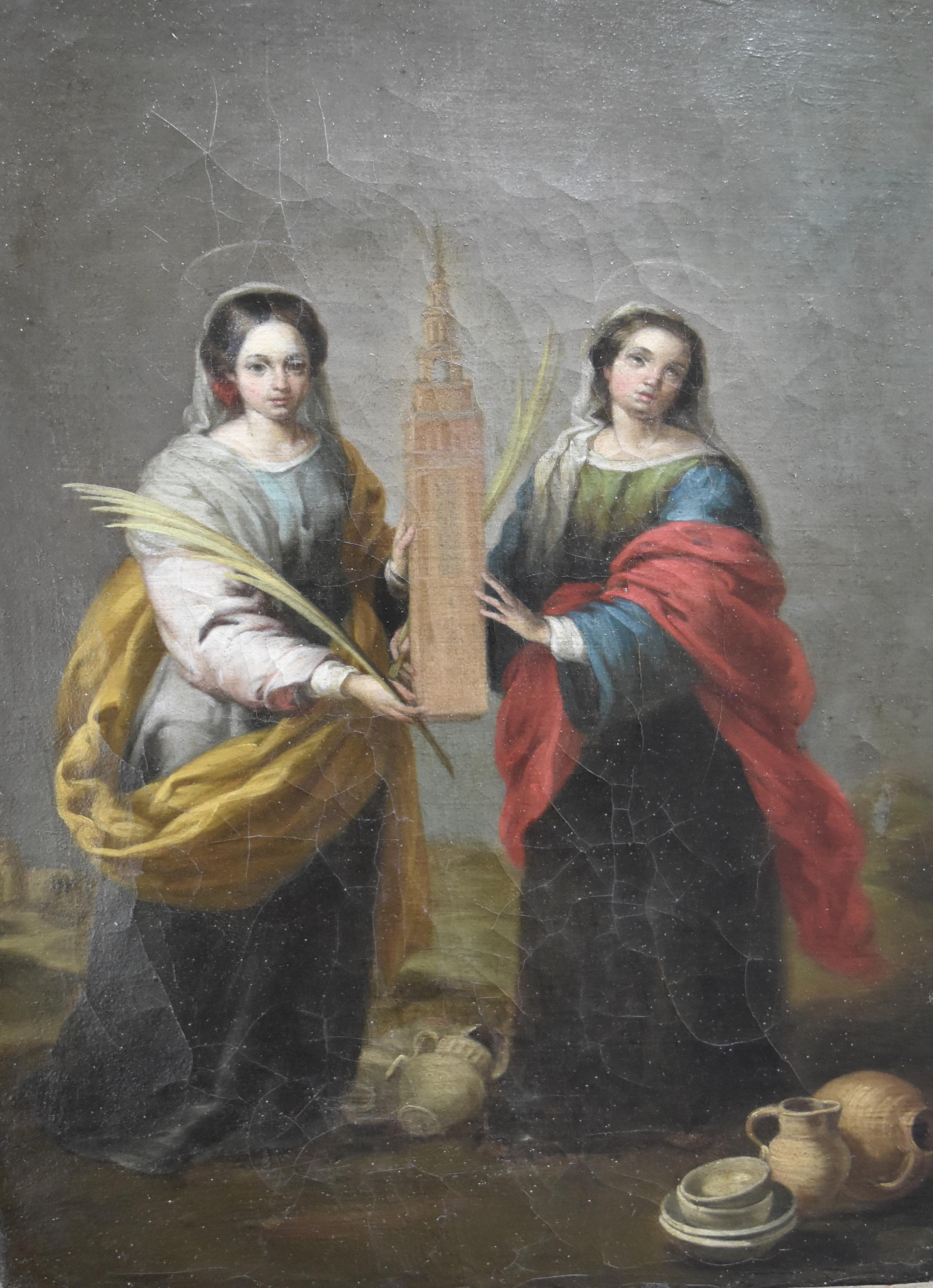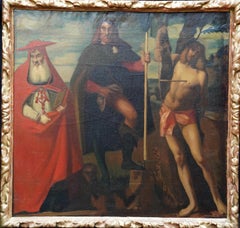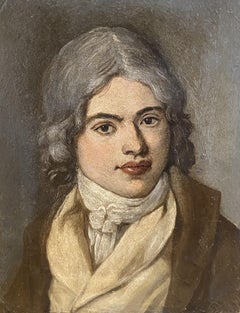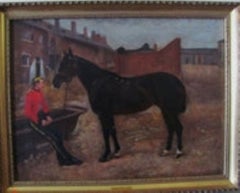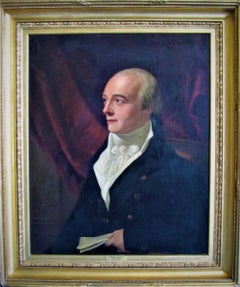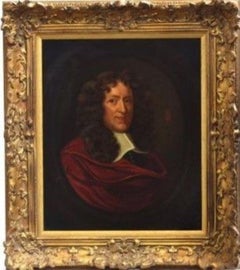Items Similar to Portrait of a Lady with White Gloves - British 18thC art Old Master oil painting
Want more images or videos?
Request additional images or videos from the seller
1 of 18
Portrait of a Lady with White Gloves - British 18thC art Old Master oil paintingCirca 1750
Circa 1750
About the Item
This charming British 18th century Old Master portrait oil painting is attributed to noted portrait artist Thomas Hudson. Hudson was most prolific between 1740 and 1760 and, from 1745 until 1755 was the most successful London portraitist. On studying his work, this painting bears strong similarities to Barbara Bagot/Mrs Sneyd, see below. Painted circa 1750 this is a three quarter length standing portrait of a lady with classical figures behind her. She is dressed in a silk dress with pink bodice and a straw hat. Of interest is that the sitter is in the process of either putting on or taking off her gloves as she gazes at the artist/viewer with a slight smile. It was probably their direct contact with the skin that led to the eroticism of gloves. Not only were pairs often exchanged between lovers, but from the 16th to the 18th centuries, it was common practice to remove one glove and give it as a gift to a favourite. Besides the symbolism of the gloves, there is lovely detail and brushwork in her dress and facial features making this a superb example of an 18th century Old Master oil painting.
Barbara Bagot (1725 - abt. 1796) was the daughter of Walter Bagot and Barbara Legge. She was baptised on 15 Apr 1725 in Blithfield, Staffordshire, England. She married Ralph Sneyd on 17 Apr 1750 at St Martin in the Fields, Westminster, Middlesex, England.
Provenance. Dorset estate.
Condition. Oil on canvas, 50 inches by 40 inches unframed, in good condition.
Frame. Housed in the original carved gilt period frame 57 inches by 47 inches framed and in good condition.
Thomas Hudson (1701-1779) was an English portrait painter. Hudson was born in Devon in 1701. His exact birthplace is unknown. He studied under Jonathan Richardson in London and against his wishes, married Richardson's daughter at some point before 1725. Hudson was most prolific between 1740 and 1760 and, from 1745 until 1755 was the most successful London portraitist. He had many assistants, and employed the specialist drapery painter Joseph Van Aken. Joshua Reynolds, Joseph Wright and the drapery painter Peter Toms were his students. Hudson visited the Low Countries in 1748 and Italy in 1752. In 1753 he bought a house at Cross Deep, Twickenham, just upstream from Pope's Villa. He retired toward the end of the 1750s. He died at Twickenham in 1779. His extensive private art collection was sold off in three separate sales. Many of Hudson's works may be seen in art galleries throughout the United Kingdom. They include the National Portrait Gallery, the National Maritime Museum, Tate, Barnstaple Guildhall, Foundling Museum and the Bristol City Museum and Art Gallery.
- Attributed to:Thomas Hudson (1701 - 1779, British)
- Creation Year:Circa 1750
- Dimensions:Height: 57 in (144.78 cm)Width: 47 in (119.38 cm)Depth: 2 in (5.08 cm)
- Medium:
- Movement & Style:
- Period:
- Condition:
- Gallery Location:London, GB
- Reference Number:1stDibs: LU853113069902
About the Seller
5.0
Platinum Seller
Premium sellers with a 4.7+ rating and 24-hour response times
1stDibs seller since 2018
444 sales on 1stDibs
Typical response time: <1 hour
- ShippingRetrieving quote...Shipping from: London, United Kingdom
- Return Policy
Authenticity Guarantee
In the unlikely event there’s an issue with an item’s authenticity, contact us within 1 year for a full refund. DetailsMoney-Back Guarantee
If your item is not as described, is damaged in transit, or does not arrive, contact us within 7 days for a full refund. Details24-Hour Cancellation
You have a 24-hour grace period in which to reconsider your purchase, with no questions asked.Vetted Professional Sellers
Our world-class sellers must adhere to strict standards for service and quality, maintaining the integrity of our listings.Price-Match Guarantee
If you find that a seller listed the same item for a lower price elsewhere, we’ll match it.Trusted Global Delivery
Our best-in-class carrier network provides specialized shipping options worldwide, including custom delivery.More From This Seller
View AllSaint Roch with Saint Jerome + Saint Sebastian - British Edwardian oil painting
By Wilfred Gabriel de Glehn
Located in London, GB
This superb religious figurative oil painting is by noted artist Wilfred de Glehn. Although some experts rank de Glehn alongside Sargent, he is considered as something of a late British Renoir, for his deft use of sunlight and shadow. Indeed he was good friends with John Singer Sargent and collaborated with his on some projects. This painting, painted circa 1910 is of three saints, from left to right they are Saint Jerome, Saint Roch and Saint Sebastian. It is based on a work attributed to 16th century artist Alessandro Oliverio. Saint Jerome was a biblical translator and monastic leader and is depicted in red, holding books. Saint Roch and Saint Sebastian were known as the Plague saints - Plague saints offered hope and healing before, during, and after times of plague. A specific style of painting, the plague votive, was considered a talisman for warding off the plague. It portrayed a particular saint as an intercessor between God and the person or persons who commissioned the painting – usually a town, government, lay confraternity, or religious order to atone for the "collective guilt" of the community. Rather than a society depressed and resigned to repeated epidemics, these votives represent people taking positive steps to regain control over their environment. Paintings of Roch represent the confidence in which renaissance worshipers sought to access supernatural aid in overcoming the ravages of the plague. The thirteenth-century Saint Roch (or Rocco), whose death is still commemorated in Italy, is especially invoked against the plague. He attended plague victims in public hospitals in Italy according to traditional accounts of his life. Images attributed to the Spanish historical painter Nicolás Borrás in the Royal Cornwall Museum, or other works in institutions from The National Gallery to the Wallace Collection, show him baring his thigh to show the mark of the plague, as he is in this painting. Saint Roch is also the patron saint of dogs, after one carried food to him in the prison where he died...
Category
1910s Old Masters Portrait Paintings
Materials
Oil
Oval Portrait of a Gentleman - French Old Master c1700 art oil painting
By Nicolas de Largillière
Located in London, GB
This superb French Old Master oval portrait oil painting is attributed to circle of Nicolas de Largilliere. Painted circa 1700 it is a half length portrait of a gentleman in a red co...
Category
Early 1700s Old Masters Portrait Paintings
Materials
Oil
$6,505 Sale Price
20% Off
Portrait of a Lady with Pink Bow - British c 1820 Old Master art oil painting
By Sir Thomas Lawrence
Located in London, GB
This lovely British Old Master portrait oil painting is attributed to circle of Sir Thomas Lawrence. Painted circa 1820 it is a seated half length portrait of a beautiful lady in a b...
Category
1820s Old Masters Portrait Paintings
Materials
Oil
$12,994 Sale Price
20% Off
Portrait of Boy Playing a Flute - 18th/19th century art Old Master oil painting
Located in London, GB
This interesting painting is a British Old Master late 18th century or early 19th century oil painting attributed to Thomas Barker of Bath. It is stylistically very similar to his ot...
Category
Early 1800s Old Masters Portrait Paintings
Materials
Oil
Portrait of a Young Boy Thomas Wagstaff - Scottish art 18th century oil painting
Located in London, GB
This superb late 18th century portrait oil painting is attributed to noted Scottish artist Alexander Nasmyth. Painted circa 1790 the sitter is of the Wagstaff family, either Thomas o...
Category
18th Century Old Masters Portrait Paintings
Materials
Oil
Portrait of a Young Boy - British art 1780 Old Master male portrait oil painting
By Joseph Wright of Derby
Located in London, GB
This lovely Old Master portrait oil painting is attributed to the circle of Joseph Wright of Derby. Painted circa 1780 the painting is of a boy in a tunic and wide collar. A really c...
Category
18th Century Old Masters Portrait Paintings
Materials
Oil
$8,392 Sale Price
20% Off
You May Also Like
French school late 18th Century, Portrait of a young man, oil on metal
Located in Paris, FR
French school late 18th Century
Portrait of a young man
oil on metal
10.2 x 7.7 cm
Framed under glass : 24.4 x 21.8 cm
This small portrait painting, quite original in its technique...
Category
Late 18th Century Old Masters Portrait Paintings
Materials
Oil
19th century landscape/portrait horse with army officer, William Edward Millner
By William Edward Millner
Located in York, GB
Portrait of a bay horse with army officer seated on a drinking trough, signed with monogram and and dated 81', inscribed verso 'by W E Milner, Gainsborough', oil on canvas.
The size overall being 44 x 57 cm (17.5 x 22.5 inches) whilst the image is 35 x 48 cm ( 19 14 inches )
In very good condition housed in a gilt frame.
William Edward Millner...
Category
19th Century Old Masters Portrait Paintings
Materials
Oil
19th century Portrait Spencer Perceval Attributed To George Francis joseph
By George Francis Joseph
Located in York, GB
A late 18th early 19th century oil on canvas Portrait of Prime Minister Spencer Perceval, bust-length, in an interior, holding papers.Attributed to George Francis Joseph...
Category
19th Century Old Masters Portrait Paintings
Materials
Oil
Mary Beale (circle) Portrait Painting of Sir John Pettus
By (Circle of) Mary Beale
Located in York, GB
A very fine oil on canvas of Sir John Pettus ,circle of Mary Beale 17th century
Wearing a red cloak and a black tunic with white collar. His coat of arms to the right.
Housed in a gilt frame, the size overall being 85 x 74 cm whilst the painting is 76 x 63.5cm
In overall excellent condition.
There is a wealth of history about the sitter online , below is a brief resume
John Pettus
Sir John Pettus (1613–1690) was an English royalist, politician and natural philosopher. Pettus was an expert on metallurgy and became a deputy governor of the royal mines in England and Wales under Charles I and II. He is known for the first English translation of the work of the German metallurgist Lazarus Ercker.
Pettus’s grandfather was a wealthy Norwich merchant ,he purchased the manor of Rackheath in 1590 and represented the city in 1601 and 1604-10. Although a younger son, Pettus inherited the manors of Chediston and Wenhaston, He married well; but even before the Civil War most of his estate was mortgaged, and his wife’s expectations were never realized, owing to her father’s misfortunes as leader of the City Royalists. Pettus became a servant to Charles I, and took part in the farcical royalist attempt on Lowestoft in March 1643, but was exchanged after nearly a year in prison. It is unlikely that he resumed command of his regiment, such as it was, since he ‘continued inoffensive till the taking of Bristol’ by the New Model Army...
Category
17th Century Old Masters Portrait Paintings
Materials
Oil
Portrait of a Man, 17th Century Dutch Oil on Panel Portrait
By Cornelis Dusart
Located in London, GB
Circle of Cornelis Dusart
Dutch 1660 - 1704
Portrait of a Man
Oil on panel
Image size: 7¾ x 5¼ inches
Giltwood frame
Cornelis Dusart
Cornelis ...
Category
17th Century Old Masters Portrait Paintings
Materials
Oil, Panel
Spanish School 19th century, Santa Justa and Santa Rufina, oil on canvas
Located in Paris, FR
Spanish School of the 19th Century
Santa Justa and Santa Rufina
Oil on canvas
40 x 27 cm
In quite good condition, the paint surface presents numerous crack...
Category
1840s Old Masters Figurative Paintings
Materials
Oil
$1,405 Sale Price
29% Off
Recently Viewed
View AllMore Ways To Browse
Antique Art Exchange
Antique Gloves
Lady Dior Gray
Bear Skin
Tom Wright
Staffordshire Painting
18th Century Portrait Pair
Antique Staffordshire Figures
Walter Wright
Pair Of 18th Century Italian Oil Paintings
Pink Staffordshire
English Portraits 16th Century
Peter Wright
Cross Pope
Dior Straw Hat
Oil Pairing 16th
Oliver Samsinger
Portrait Of A Debutante
